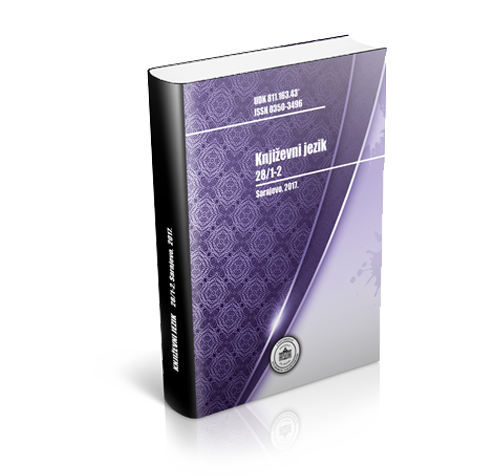О функционирању језика у југословенској федерацији (социолингвистичка ситуација у једној вишејезичној и вишенационалној европској државној заједници)
On the functioning of languages in Yugoslav federation (The socio-linguistic situation in one multilingual and multinational European state community)
Author(s): Dalibor BrozovićSubject(s): Sociolinguistics, South Slavic Languages, Politics and Identity
Published by: Institut za jezik
Keywords: Yugoslavia; socio-linguistics; multilingual and multinational state; language and territory; Yugoslavian languages;
Summary/Abstract: This work represents an attempt to give typological characteristics of the Socialist Federal Republic of Yugoslavia as a multilingual and multinational union of states. The first part of this paper contains definitions of the category of developed state-formations of multilingual and multinational (or at least multiethnic) character. By separating this category from similar but complex and undeveloped state-formations (typical of Africa) as well as from such state nations having to deal with language and national status of their minorities, it has been established that the above mentioned category comprises such countries as: the Socialist Federal Republic of Yugoslavia, Czechoslovakia, USSR, Switzerland, Belgium, Canada, India and formerly Austria- Hungary. The second part of this paper is concerned with the establishment of the criteria for the typological description of the mentioned category as well as with the classification of (socio) linguistic phenomena related to it. These criteria w ere based upon the ten following questions: 1. does the territorial division coincide globally with the linguistic and(or) ethnic one, 2. are standard languages in question the principal polyfunctional linguistic instruments on their respective territories, 3. can the speakers of such standard languages be considered as forming a fully developed nations, 4. is the community involved multilingual or bilingual, 5. do the languages involved cross to a large extent the frontiers of the state-formation, 6. do the dialectal bases underlying the standard languages have the common background, 7. do standard languages make possible for their users to share the same civilization and cultural contexts, 8. is it possible to detect in the standard language any trace of the colonial linguistic heritage, 9. is any of the standard languages in the state community considered to be a privileged one, and 10. can the great majority of people in the community actually speak the major language. The above mentioned questions were first supplied with the answers pertaining only to Yugoslavia. The further step was to compare other countries from the same category with Yugoslavia and the result of such comparison was very much in favor of Yugoslavia. Finally, the comparison was made between Yugoslavia and Austria-Hungary the latter serving only as a control-sample. The last part of this paper deals with the specific features of Yugoslavia considering the complex linguistic situation on the territory where Serbo-Croat is spoken and which is the common language of Serbs, Croats, Montenegrins and Moslems (in Bosnia and Herzegovina). The last part also contains two possible interpretations of the term »Yugoslavian languages« which cannot be grounded on any either genetic or typological linguistic feature, but which can be, from a sociolinguistic point of view, justified as a legitimate term.
Journal: Književni jezik
- Issue Year: 14/1985
- Issue No: 2
- Page Range: 65-85
- Page Count: 21
- Language: Croatian, Serbian

